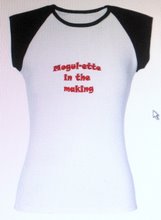
One story I shared with them was how I started my Mogulette blog a year and a half ago. I met a woman who was having a lot of difficulty finding a job in her industry so she decided to start blogging. Six months later she had a book deal and a year after that she landed a job in her field in addition to lining up speaking engagements. Her story inspired me so much I immediately created a Blogger account and started writing. Her advice was to write as much as possible, like at least 2-3 times a week or more. However I never managed to enter more than one post a week (except like, right now when it's been two weeks since I wrote last, but, who's counting?), but the beauty of it is that even with minimal writing I still get results.
Today through my blog I make valuable connections I would never make otherwise. It's not only a source for consulting leads but it's also a great way for journalists and referral partners to find me. Forbes.com recently stumbled across my blog and asked me to join their Blog Network and share ad revenues with them. Last week Dale King of GuruKnowledge.org found me and asked if he could interview me for his blog (I'll be on his home page for a week). And suddenly I'm getting pitches from PR people to feature their clients on my blog.
I think it's a basic instinct we have in all of us - the curiosity about what other people are doing on the one hand, and the need to tell others what we're up to, on the other. Blogs - and all new media for that matter - feed that need we have inside to express ourselves and make connections - whether meaningful or superficial (super pokes!), intellectual or mundane.
Big businesses are increasingly seeing the value of 'Web 2.0' and how it can help keep the connection between them and their clients alive and the communication flowing. But it's also easier than ever for small businesses to join into the action with so much free software available today. Facebook, LinkedIn, Twitter, YouTube...in addition to blogs - make it possible for us to stay front and center in our customers' minds. The key is to pick two or three of them and focus on those.
What new media tools work best for you? How do you manage all your social networks? Please share your tips!
Thursday, July 24, 2008
Blogs - Your Electronic Calling Card to the World
Posted by
Carmina Pérez
at
3:01 PM
3
comments
![]()
Labels: blogs, Dale King, Forbes.com, GuruKnowledge.org, Mogulette-in-the-making, new media
Sunday, July 6, 2008
Basic Web Pages Every Site Should Have
 For the past month I've been teaching a Do-It-Yourself Website Building workshop and right now we're working on content, so I thought I'd share some of the information I gathered for the class. We'll be focusing mainly on the basics: 1. the home/welcome page, 2. the "about us" page, and 3. the "contact us" page. Ready to start the "web waltz"? And a 1-2-3, 1-2-3...
For the past month I've been teaching a Do-It-Yourself Website Building workshop and right now we're working on content, so I thought I'd share some of the information I gathered for the class. We'll be focusing mainly on the basics: 1. the home/welcome page, 2. the "about us" page, and 3. the "contact us" page. Ready to start the "web waltz"? And a 1-2-3, 1-2-3...
Before we start, however, there are a few things to keep in mind:
Keywords are key
Don't build your site using only images because then search engines won't be able to find you (fate worse than death!). Think of words, terms and phrases people would most likely type into a search engine to find a product or service like yours. Make a list of 20-30 and choose the most relevant ones for each page. The ones that describe your home page may not be the same as the ones for a particular product page, or for an article you may have written.
Insert keywords:
1-Into the text – titles, subtitles, paragraphs, hyperlinks, sidebar text. But don't overdo it! Google will penalize you if you flood each page with keywords, so stick to one per paragraph. Conversely, if there's too few keywords the search engines will think it’s not about that topic, so shoot for a happy medium.
2-Into the coding of the site - meta tags, title tag, description tag , keyword tags
Overall Content
What images come up to your mind when you think about your business? Those are the same pictures you need to paint to convey your marketing message. Building your reputation and your brand is like dating - you have to woo your prospects in by showing them your best qualities so #1 - they'll like you, and #2 - they'll trust you. Selling is all about trust, so be personable, let your personality shine through - quirks and all.
As David Vinjamuri says in his new book, Accidental Branding, the best brands create a myth around them. People love stories, and sharing your story will allow them to like you. The more they like you the more likely they'll buy something from you. David points to J. Peterman's website, where every product page tells a different anecdote or adds a snippet that whets your appetite. And he continuously keeps the myth alive by writing a blog that gets tons of comments (for more on this read Creative Storytelling).
So write in the first person, as if you were talking to someone you like, and share your stories. Tell them about you, what problems your products and services solve and how they do that. But stay truthful to who you are. By telling them a good story you're giving people the tools to tell others about you.
Now to the nitty gritty...
1- Home/Welcome Page
Like the quote says, "you never get a second chance to make a first impression". Your welcome page introduces you to the world, so you want to make sure that it is presenting the right information in a clear and easy to follow manner. Don't make it hard for people to find things, and keep the main points "above the fold", so they don't have to scroll down. Your home page should be a portal where you can direct people to the deeper sales content pages. The Search Engine Guide recommends keeping text to a minimum in the home page. (See: 7 Ways to Make your Home Page A Home Run)
2- About Us
Whenever I visit a new website one of the first pages I click on is "About Us". That's where I expect to find out the who, what, when, where and how of the site, and if it's not there, I usually take that as a bad sign and move on. A well written "about us" page, on the other hand, will help you be credible, findable and likable, as a recent post on Search Engine Land says (see Making a Good Impression with About Us Pages). The article has a ton of great suggestions of what to include in your about page. Here's a few, plus some of my own:
- Mission Statement
- Bios of you, your employees
- Photos and/or video of yourself, your office or employees - add keyword-rich captions and descriptions so people doing image or video searches can find you
- A history or timeline of your business
- Case Studies
- Testimonials
- Store hours, location, a map
- Customer Service Policies (on returns, shipping, privacy, etc.)
- Descriptions of community involvement or membership in local organizations
- Awards received
- A link to your press page
- Job openings
- 5 Easy Ways to Make Your About Us Page More About Your Customer
- About Your Website's About Us Page
3- Contact Us
Want to make your list of prospects grow? Make sure you have a way to collect email addresses on your "contact us" page. It doesn't work just to give them your contact information and pray they'll call. By collecting email addresses you can keep potential clients abreast of industry happenings, special events, promotions, or new products/services. It's like sending them a little reminder of who you are so when they're ready to do business they'll think of you first. For ideas on how to collect emails see 6 Ways To Get Your Visitors to Contact You From Your 'Contact Us' Page.
Map out all the information first
Know that you have a rough idea of what goes into each page, take a moment to think about what information you’d like to include in each of them. In a separate, blank piece of paper write a simple outline for each – this will be your blueprint. For ex., in your "about us" page you'll need your bio and a picture, as well as links to other pages on your site that might show samples of your work. For the products page you may want to have thumbnail images of products with a short description and then a link to individual product pages. Make sure to have calls to action in every page - ex. subscribe to my newsletter/blog, buy my products, come to my event, hire me, etc.
Well there is it - your 3 basic pages. Did I miss anything? Please let me know!
Posted by
Carmina Pérez
at
8:10 PM
2
comments
![]()
Labels: about us, contact us, home page, web content, welcome page












